2022 Mandela Washington Fellows and Sustainability Initiatives
September 8, 2022
Drexel University was honored to welcome 25 Mandela Washington Fellowship alumni, the flagship program of the Young African Leaders Initiative (YALI), to campus for a two-week Alumni Enrichment Institute from July 25 through August 5, 2022 sponsored by the U.S. Department of State.
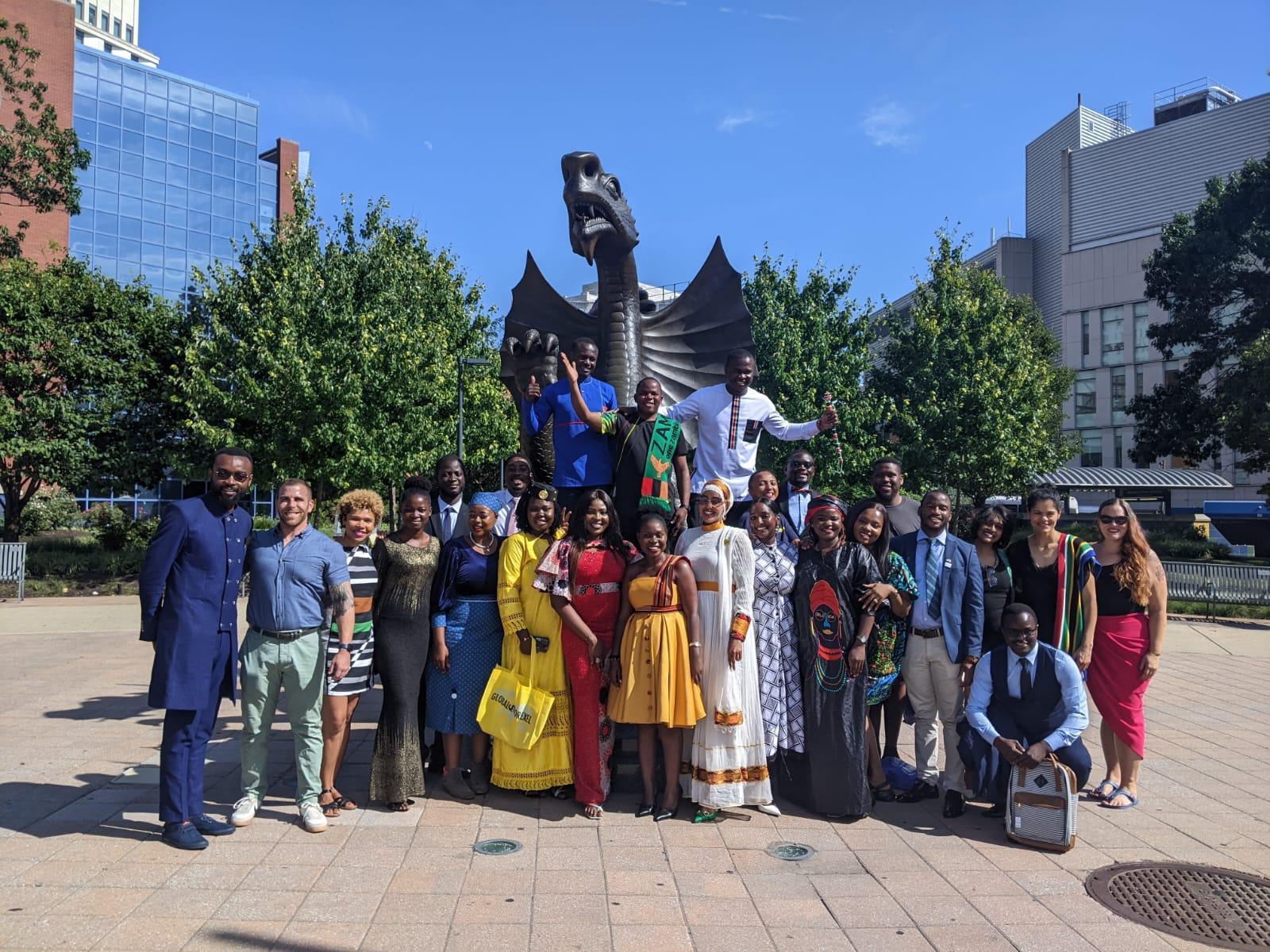 YALI was created in 2010 and supports young Africans as they spur economic growth and prosperity, strengthen democratic governance, and enhance peace and security across Africa. Since 2014, the U.S. Department of State has supported nearly 5,100 Mandela Washington Fellows from across Sub-Saharan Africa to develop their leadership skills and foster connections and collaboration with U.S. professionals.
YALI was created in 2010 and supports young Africans as they spur economic growth and prosperity, strengthen democratic governance, and enhance peace and security across Africa. Since 2014, the U.S. Department of State has supported nearly 5,100 Mandela Washington Fellows from across Sub-Saharan Africa to develop their leadership skills and foster connections and collaboration with U.S. professionals.
The 2022 Alumni Enrichment Institute was facilitated by Adam Zahn, Office of Global Engagement, with support from Joseph Amon, PhD, Dornsife School of Public Health, Alonzo Flowers, PhD, School of Education, and Anne Willkomm, MFA, Graduate College.
These impressive young scholars, activists, creators, educators, and entrepreneurs came to Drexel University to continue building the professional and leadership skills they developed during their virtual 2021 Leadership Institutes.
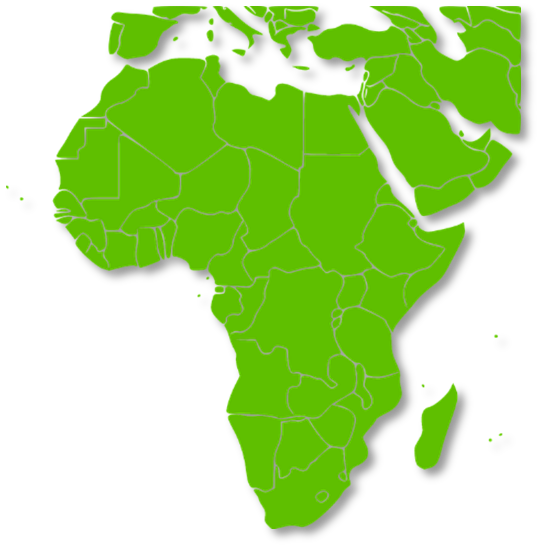 The two-week Alumni Enrichment Institutes, held a various universities around the country, leveraged experiential and discussion-based learning to provide participants with broadly applicable knowledge about U.S. culture and society and immerse them in a U.S. community through community service, cultural exchange, strategic networking, and site visits. Participants also engaged in programming on topics such as the United States’ diverse culture and society, resiliency and ethics in leadership, and social justice principles. Drexel University Fellows visited local sites through a tour of the Constitution Center and a walking tour of Old City, a day trip to New York City, and visits to local businesses such as Africom and the Drexel University Environmental Collaboratory, as well as a visit to City Hall to meet with the Philadelphia mayor and other prominent city leaders.
The two-week Alumni Enrichment Institutes, held a various universities around the country, leveraged experiential and discussion-based learning to provide participants with broadly applicable knowledge about U.S. culture and society and immerse them in a U.S. community through community service, cultural exchange, strategic networking, and site visits. Participants also engaged in programming on topics such as the United States’ diverse culture and society, resiliency and ethics in leadership, and social justice principles. Drexel University Fellows visited local sites through a tour of the Constitution Center and a walking tour of Old City, a day trip to New York City, and visits to local businesses such as Africom and the Drexel University Environmental Collaboratory, as well as a visit to City Hall to meet with the Philadelphia mayor and other prominent city leaders.
While learning about the interests and projects of the fellows, there was a popular and common theme: environmental welfare and sustainability. Many of the fellows have started ventures fighting pollution and climate change. We asked them several questions about their work.
What initially got you interested in working in the environmental welfare and/or the sustainability sector?
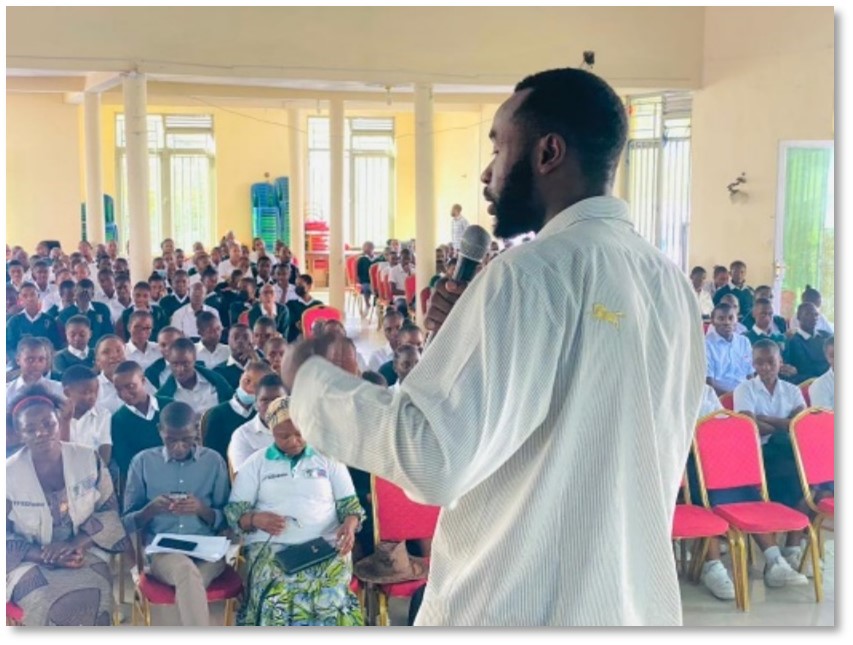 “My dad is an inherent conservationist; he has a great passion for nature (plants and animals). Our home until today has remained like a small forest in the middle of an urban area. Since he bought the land in late 90’s, he hasn’t cut any of the trees that are present on the compound. We grew up knowing that we were allowed to do everything in the compound apart from cutting trees or tampering with the animals (we have around 10 bird species in our plot).
“My dad is an inherent conservationist; he has a great passion for nature (plants and animals). Our home until today has remained like a small forest in the middle of an urban area. Since he bought the land in late 90’s, he hasn’t cut any of the trees that are present on the compound. We grew up knowing that we were allowed to do everything in the compound apart from cutting trees or tampering with the animals (we have around 10 bird species in our plot).
In 2018, I met a young African from Mauritania in a U.S. Department of State-funded fellowship who went on raising awareness to me about climate change and the role everyone has to play to keep the world livable. He explained to me about how entire communities are being affected by recurrent droughts, rising sea levels, extreme weather, and advancement of desertification in his home country in Mauritania.
I went on reading more about environmental protection and climate change. My goal in life being to do my part in making sure we bring Africa to a place where she will contribute effectively in making this world better, especially in this period where COVID-19 has reminded us how our lives are interconnected. So, two years later, I started a nonprofit called “Groupe Utalii Kwetu” working to support environmental protection efforts and promote eco-tourism in Democratic Republic of Congo.”
-Veridique Kakule, Democratic Republic of Congo
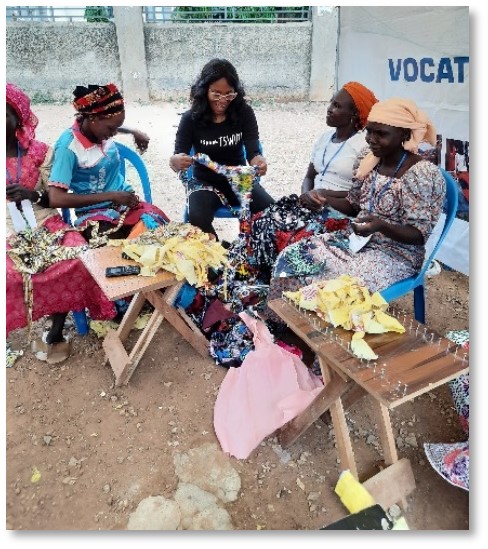 “My Interest in sustainability started through my passion for millinery and fashion accessory design. Millinery was something I did as a "side hustle," creating hats and fascinators from textile waste offcuts. But it has grown from being a "side hustle" to an impactful life changing project that has provided availability for vocational skills training, business start-ups for low-income women, and, most importantly, a channel for awareness creation on sustainability and environmental protection.”
“My Interest in sustainability started through my passion for millinery and fashion accessory design. Millinery was something I did as a "side hustle," creating hats and fascinators from textile waste offcuts. But it has grown from being a "side hustle" to an impactful life changing project that has provided availability for vocational skills training, business start-ups for low-income women, and, most importantly, a channel for awareness creation on sustainability and environmental protection.”
-Chisom Nwankwo, Nigeria
"The issue of environmental management is becoming increasingly acute in African countries. Most of the continent's environmental problems stem from poverty and lack of education. These countries, including Chad - a Central African country heavily affected by climate change and, by far, the least prepared to deal with its effects - must make great efforts and demonstrate education to prepare future generations to deal with environmental problems.
In the face of these challenges, the public authorities have not stopped at national legislation, regulations, and the ratification of several international conventions and agreements on environmental protection. They pleaded for the mobilization of the educational community in the fight for the protection and restoration of the environment.
Marked by poverty and strong demographic growth, Chad is subject to strong environmental constraints (droughts, progressive drying up of Lake Chad, irregular rainfall, recurrent pollution, conflicts between herders and farmers, progressive advance of the desert, etc.), today amplified by disturbances affecting the whole planet (climate change).
Faced with the alarming degradation of its environment, Toumaï Country has become aware of the urgency of becoming aware of environmental issues and the need to implement concrete actions to ensure sustainable management of its natural resources in order to ensure sustainable development.
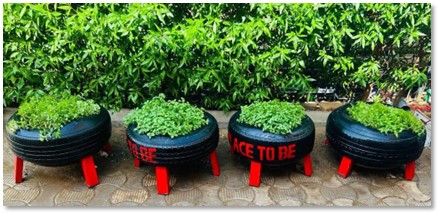 Being a poor and underdeveloped country, Chad suffers enormously from plastic waste pollution, all cities are submerged by plastic waste, everywhere the environment is degraded playing negatively on the health of the population and animals. However, neither the producers, nor the importers, even less the consumers, are sensitized or informed on the dangers related to plastic waste, hence the need for this awareness campaign and plastic waste management in Chad.
Being a poor and underdeveloped country, Chad suffers enormously from plastic waste pollution, all cities are submerged by plastic waste, everywhere the environment is degraded playing negatively on the health of the population and animals. However, neither the producers, nor the importers, even less the consumers, are sensitized or informed on the dangers related to plastic waste, hence the need for this awareness campaign and plastic waste management in Chad.
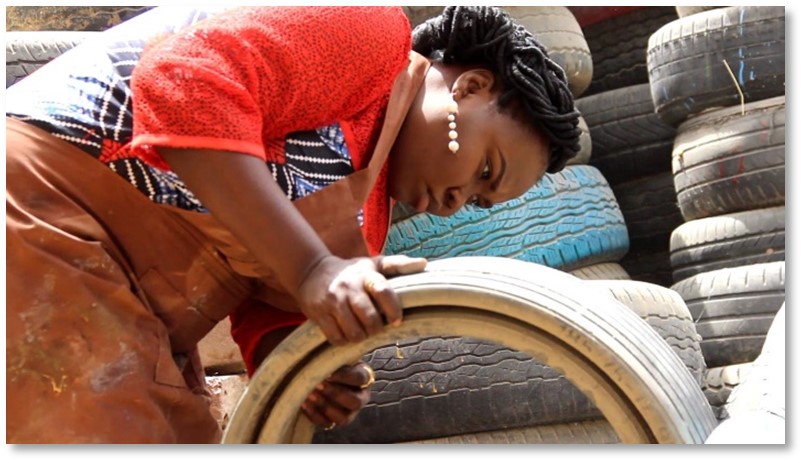 In Chad, 20 tons of plastic waste are produced annually. The city of N'Djamena alone generates 19,764 tons of plastic waste per year, according to official figures given by the Ministry of Environment, Water, and Fisheries. (Association Agir pour le Développement Durable)
In Chad, 20 tons of plastic waste are produced annually. The city of N'Djamena alone generates 19,764 tons of plastic waste per year, according to official figures given by the Ministry of Environment, Water, and Fisheries. (Association Agir pour le Développement Durable)
Driven by the entrepreneurial spirit since my childhood and guided by the love of nature I decided to specialize in recycling and environmental education because I am concerned about the environment and the well-being of the planet.”
-Sylvie Pitimbaye, Chad
Please describe the work you are doing around environmental welfare and sustainability.
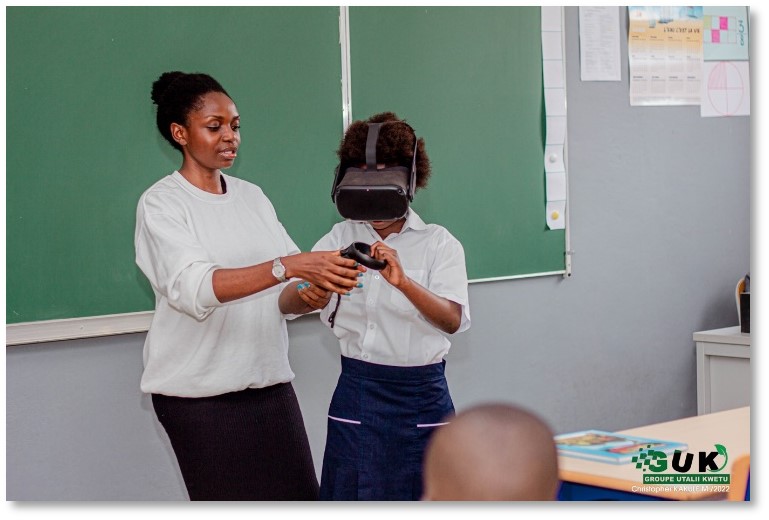 "I believe that preserving Africa’s surviving tropical forests and planting new trees to replace those lost to deforestation could help reduce the severity of climate change by absorbing more carbon from the air, and ease the local impact of climate change by regulating local weather conditions. For that reason, and in the specific case of Democratic Republic of the Congo, changing the way the government and people value forests is critical to the survival of those forests.
"I believe that preserving Africa’s surviving tropical forests and planting new trees to replace those lost to deforestation could help reduce the severity of climate change by absorbing more carbon from the air, and ease the local impact of climate change by regulating local weather conditions. For that reason, and in the specific case of Democratic Republic of the Congo, changing the way the government and people value forests is critical to the survival of those forests.
Education remains my core approach to achieving my environmental goal. In this regard, my efforts are channeled through “Utalii Kwetu” Program, a flagship program of my nonprofit, “Groupe Utalii Kwetu.” That program aims to introduce schoolchildren to ecotourism and environmental protection in all the classes of primary school. We are now in the pilot phase of the program reaching 6,175 schools kids spread across 25 schools surrounding Virunga National Park in Eastern Congo.”
-Veridique Kakule, Democratic Republic of Congo
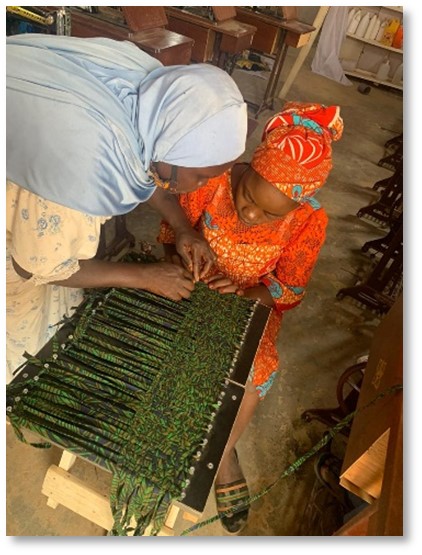 “I work with refugees and internally displaced persons through my nonprofit called “The Skilled Women Initiative (TSWINI)” founded in 2017 in Abuja, Nigeria. I teach skills such as textile, plastic, and tire waste upcycling as a sustainable climate change adaptation skill. We have trained over 1,000 refugees to create jobs and new means of income through plastic and textile waste collection. In the last five years, we have upcycled over ten tons of textile waste into rugs, bags, and furniture.”
“I work with refugees and internally displaced persons through my nonprofit called “The Skilled Women Initiative (TSWINI)” founded in 2017 in Abuja, Nigeria. I teach skills such as textile, plastic, and tire waste upcycling as a sustainable climate change adaptation skill. We have trained over 1,000 refugees to create jobs and new means of income through plastic and textile waste collection. In the last five years, we have upcycled over ten tons of textile waste into rugs, bags, and furniture.”
-Chisom Nwankwo, Nigeria
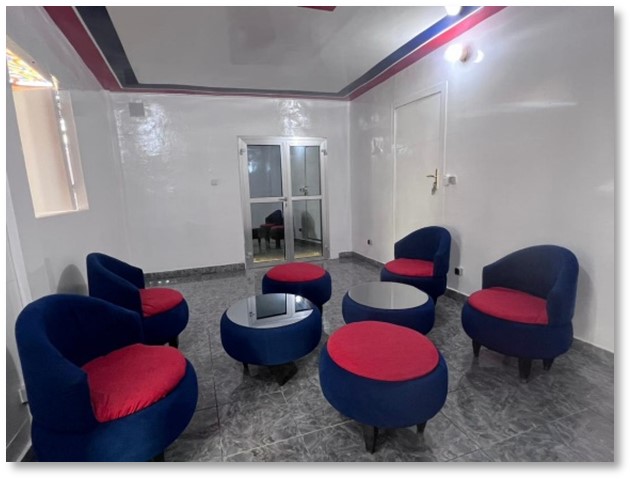 "As I am passionate about decoration, I have created a recycling structure called "Noudji Décor et Art," a socio-educational project initiated with the aim of raising awareness and mobilizing the Chadian population in general, and in Ndjamena in particular, on the system of transformation of plastic waste (bottles) and used tires into useful objects, manufacturing of garbage bins, and ecological paving stones. The decorative objects can be used for living rooms, offices, parties, etc. (This organization also partners to work with youth in the ISEC- International Student Environmental Coalition). The main mission is to protect the environment and introduce young people to the importance of waste recycling.”
"As I am passionate about decoration, I have created a recycling structure called "Noudji Décor et Art," a socio-educational project initiated with the aim of raising awareness and mobilizing the Chadian population in general, and in Ndjamena in particular, on the system of transformation of plastic waste (bottles) and used tires into useful objects, manufacturing of garbage bins, and ecological paving stones. The decorative objects can be used for living rooms, offices, parties, etc. (This organization also partners to work with youth in the ISEC- International Student Environmental Coalition). The main mission is to protect the environment and introduce young people to the importance of waste recycling.”
-Sylvie Pitimbaye, Chad
Who is the target audience to get involved with your projects?/How do you engage your community in learning about these projects?
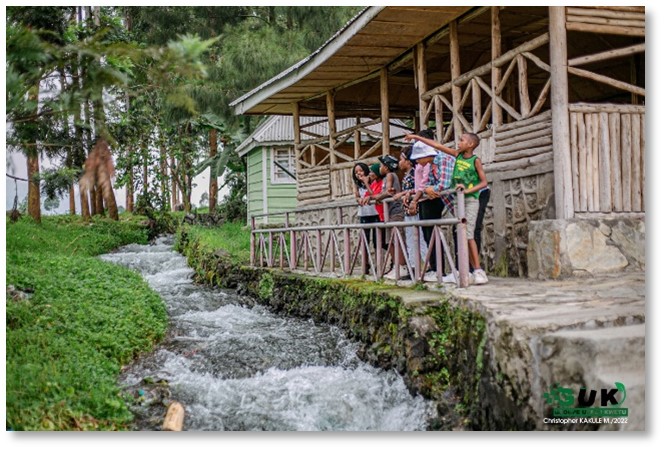 “My target audience are kids… Education is definitely one of the greatest weapons one can use to change the world.”
“My target audience are kids… Education is definitely one of the greatest weapons one can use to change the world.”
-Veridique Kakule, Democratic Republic of Congo
“Refugees, displaced people, and women living in rural communities are the main beneficiaries of our physical training on sustainable livelihoods. Our greatest means of engagement is community outreaches, town hall meetings, and most recently social media.”
-Chisom Nwankwo, Nigeria
“We work with young people in the framework of training in recycling management, especially young girls who are more involved, raising awareness of the population on waste management and their implications as a key player in the management of the fight against climate change.”
-Sylvie Pitimbaye, Chad
What is your favorite environmental education activity for your community?
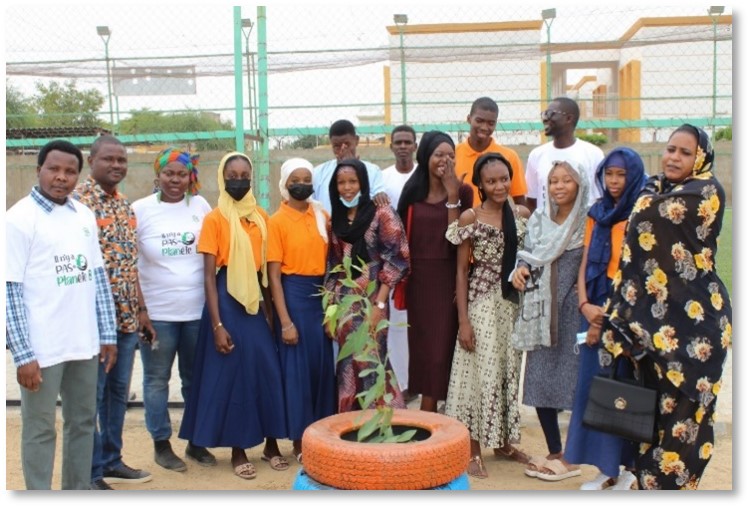 “We organize an annual contest between the 25 schools enrolled in our program, and it’s really striking to see kids of less than six years proposing creative ways to tackle environmental issues in their own communities. One of this years’ competition finalists created a multi-purpose bag using recycled plastic waste. Not only has she responded to a community problem, but helps to fight plastic waste pollution which is a major issue in Lake Kivu, a lake bordering Rwanda and Democratic Republic of Congo. I really believe that this program will have a lasting impact on the thousands of kids we are working with and many more.”
“We organize an annual contest between the 25 schools enrolled in our program, and it’s really striking to see kids of less than six years proposing creative ways to tackle environmental issues in their own communities. One of this years’ competition finalists created a multi-purpose bag using recycled plastic waste. Not only has she responded to a community problem, but helps to fight plastic waste pollution which is a major issue in Lake Kivu, a lake bordering Rwanda and Democratic Republic of Congo. I really believe that this program will have a lasting impact on the thousands of kids we are working with and many more.”
-Veridique Kakule, Democratic Republic of Congo
“As a milliner who uses a lot of textile offcuts, my favorite environmental education would be waste textile waste upcycling, because textile waste is the second largest polluter after oil and gas, and it isn't a topic that is widely discussed.”
-Chisom Nwankwo, Nigeria
“For recycling projects, we work directly with households through waste collection. We do training and awareness sessions where we have reached a large number of the population affected by our activities.
Our products through recycling are intended for consumption by households, companies, restaurants etc.
For the school education project, we do awareness sessions in schools from where we put ambassador clubs in schools for citizen actions towards the environment.”
-Sylvie Pitimbaye, Chad
Do you envision any ways in which your projects can be applied in the context of the United States?
“From a discussion I had with an American University Professor recently, environmental awareness is not included in the primary school curriculum in the United States. It’s shocking globally to see that even though the climate crisis is one of existential crisis being faced by humanity today, the average human being, even the one educated up to university level, is unaware about the climate problem yet each one of us has a role to play in fighting climate change. I believe that the USA, being a leader in many aspects of life, has the means to take that step forward in mainstreaming environmental education in all primary schools in the United States. The sooner we are taught about environmental protection, the better.”
-Veridique Kakule, Democratic Republic of Congo
“Definitely. In any community, even in the United States, there will always be low-income persons who can benefit from learning sustainability skills.”
-Chisom Nwankwo, Nigeria
“Yes, of course I strongly consider this alternative. Environmental challenges are now a global problem that knows no borders, no nationality, and no religion. To overcome these challenges, we all need strong, coordinated, and ambitious action. I believe this project is one that can make a difference here in the United States. For children who are well trained and equipped to protect the environment today are tomorrow's eco-responsible leaders who will provide the informed solutions and expertise for the sustainable development and the betterment that we want to create.”
-Sylvie Pitimbaye, Chad
Are there any ways for people from the United States to get involved with your project? What would you like our readers to know about your project?
“You can get involved with our project by joining us in advancing our causes through one of our campaigns:
- Support a child with a book on nature conservation and environmental protection: On top of the 6,175 children using our books now, we want to reach additional 10,000 children by next primary school year in Democratic Republic of Congo, starting in October 2022. One book goes for $10.00. You can support a kid with $10.00, support a class of 50 children with $500.00, or support an entire school of 500 kids with $5,000.00.
- Sponsor a tree: Join us in our campaign to planting 100,000 trees by the end of 2023. Sponsoring one tree goes for $2.00, the money is used to plant the tree and follow up with monitoring for the next year. Given the good climate and arable lands of the region, after that period the tree grows on its own.
- Sponsor the purchase of a Virtual Reality Headset: Our books are combined with Virtual Reality Headsets which are used as a way to experience the knowledge shared in the books. Reading about the rainforest can be interesting, but meeting a jaguar while hiking the Amazon brings those words to life. And although memorizing the stages of photosynthesis could mean a good test grade, diving inside a leaf to view the process firsthand will spark a future environmental scientist. We are now using only one VR Headsets for 6,175 children. Our goal is to secure a minimum of 50 VR headsets to create a VR Classroom and improve the virtual reality aspect of our program. One VR/AR headset goes for $500.00.
We receive online donations on our website: https://donorbox.org/support-groupe-utalii-kwetu (http://www.utaliigroup.org/).
Any amount could help.
Our social media handles:
-Veridique Kakule, Democratic Republic of Congo
You can read Veridique's entire interview here.
“The projects carried out by my organization involves teaching a lot in the rural communities in Nigeria. Since 2017, our projects have impacted the lives of over 1,000 beneficiaries, especially refugees, displaced persons, and victims of gender-based violence. The people of the United States can get involved by donating training equipment, mentoring a trainee, offering to train skills online via social media and other cloud-based meeting platforms, or simply supporting our work via social media.
Our social media handles:
- Instagram @ theskilledwomen
- Twitter @ Tskilledwomen
- Linkedin @ TSWINI The Skilled women Initiative
- Website: www.tswini.org”
-Chisom Nwankwo, Nigeria
You can read Chisom's entire interview here.
“Well, that's my overriding goal, to have a forward-thinking, cross-border collaboration to address our common challenges. It would be an opportunity to combine efforts and celebrate the creativity of Chadian and American youth for a just and worthy cause. This involvement should be possible through exchange programs, skills transfer, and professional mobility related to the critical issues of recycling, climate change, sustainable development, and nature conservation, drawing inspiration from each other, what can be done here in Chad and replicated in Chad and vice versa.
The U.S. Embassy in Chad can already be our first partner and could pave the way for other American organizations and foundations. We have many impactful projects but are too limited as a youth organization in a developing country and our capacity to respond is really low. Any constructive collaboration would only be of added value to us.
What I want readers to take away from this project is that there is no Planet B, and that to save the future of humanity we must act with solidarity, creativity, compassion and resilience as teammates and inhabitants of a single burning village.
Our social media handles:
There is an African proverb that says: "Alone we go fast, together we go farther.”
-Sylvie Pitimbaye, Chad
You can read Sylvie's entire interview here.
Interview by Ashley Trump. Photo credits to Veridique Kakule, Chisom Nwankwo, Sylvie Pitimbaye, and Ryan Day.